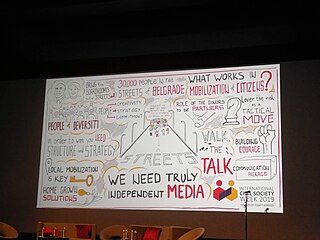A currency is a standardization of money in any form, in use or circulation as a medium of exchange, for example banknotes and coins. A more general definition is that a currency is a system of money in common use within a specific environment over time, especially for people in a nation state. Under this definition, the British Pound Sterling (£), euros (€), Japanese yen (¥), and U.S. dollars (US$)) are examples of (government-issued) fiat currencies. Currencies may act as stores of value and be traded between nations in foreign exchange markets, which determine the relative values of the different currencies. Currencies in this sense are either chosen by users or decreed by governments, and each type has limited boundaries of acceptance; i.e., legal tender laws may require a particular unit of account for payments to government agencies.

A central bank, reserve bank, or monetary authority is an institution that manages the currency and monetary policy of a country or monetary union, and oversees their commercial banking system. In contrast to a commercial bank, a central bank possesses a monopoly on increasing the monetary base. Most central banks also have supervisory and regulatory powers to ensure the stability of member institutions, to prevent bank runs, and to discourage reckless or fraudulent behavior by member banks.

In economics, inflation is an increase in the general price level of goods and services in an economy. When the general price level rises, each unit of currency buys fewer goods and services; consequently, inflation corresponds to a reduction in the purchasing power of money. The opposite of inflation is deflation, a sustained decrease in the general price level of goods and services. The common measure of inflation is the inflation rate, the annualized percentage change in a general price index. As prices do not all increase at the same rate, the consumer price index (CPI) is often used for this purpose. The employment cost index is also used for wages in the United States.

A market economy is an economic system in which the decisions regarding investment, production and distribution to the consumers are guided by the price signals created by the forces of supply and demand. The major characteristic of a market economy is the existence of factor markets that play a dominant role in the allocation of capital and the factors of production.
This aims to be a complete article list of economics topics:
The Basic Laws of Sweden are the four constitutional laws of the Kingdom of Sweden that regulate the Swedish political system, acting in a similar manner to the constitutions of most countries.

Civil society can be understood as the "third sector" of society, distinct from government and business, and including the family and the private sphere. By other authors, civil society is used in the sense of 1) the aggregate of non-governmental organizations and institutions that advance the interests and will of citizens or 2) individuals and organizations in a society which are independent of the government.

Within the budgetary process, deficit spending is the amount by which spending exceeds revenue over a particular period of time, also called simply deficit, or budget deficit; the opposite of budget surplus. The term may be applied to the budget of a government, private company, or individual. Government deficit spending was first identified as a necessary economic tool by John Maynard Keynes in the wake of the Great Depression. It is a central point of controversy in economics, as discussed below.

Monetary reform is any movement or theory that proposes a system of supplying money and financing the economy that is different from the current system.

Monetary policy is the policy adopted by the monetary authority of a nation to control either the interest rate payable for very short-term borrowing or the money supply, often as an attempt to reduce inflation or the interest rate, to ensure price stability and general trust of the value and stability of the nation's currency.

An economic system, or economic order, is a system of production, resource allocation and distribution of goods and services within a society or a given geographic area. It includes the combination of the various institutions, agencies, entities, decision-making processes, and patterns of consumption that comprise the economic structure of a given community.

Alvin Harvey Hansen was an American economist who taught at the University of Minnesota and was later a chair professor of economics at Harvard University. Often referred to as "the American Keynes", he was a widely read popular author on economic issues, and an influential advisor to the government on economic policy. Hansen helped create the Council of Economic Advisors and the Social Security system. He is best remembered today for introducing Keynesian economics in the United States in the 1930s and 40s.

Modern Monetary Theory or Modern Money Theory (MMT) is a heterodox macroeconomic theory that describes currency as a public monopoly and unemployment as evidence that a currency monopolist is overly restricting the supply of the financial assets needed to pay taxes and satisfy savings desires. MMT is opposed to the mainstream understanding of macroeconomic theory and has been criticized heavily by many mainstream economists.

Henry Calvert Simons was an American economist at the University of Chicago. A protégé of Frank Knight, his antitrust and monetarist models influenced the Chicago school of economics. He was a founding author of the Chicago plan for monetary reform that found broad support in the years following the 1930s Depression, which would have abolished the fractional-reserve banking system, which Simons viewed to be inherently unstable. This would have prevented unsecured bank credit from circulating as a "money substitute" in the financial system, and it would be replaced with money created by the government or central bank that would not be subject to bank runs.
Monetary inflation is a sustained increase in the money supply of a country. Depending on many factors, especially public expectations, the fundamental state and development of the economy, and the transmission mechanism, it is likely to result in price inflation, which is usually just called "inflation", which is a rise in the general level of prices of goods and services.
The Fifth Estate is a socio-cultural reference to groupings of outlier viewpoints in contemporary society, and is most associated with bloggers, journalists publishing in non-mainstream media outlets, and the social media or "social license". The "Fifth" Estate extends the sequence of the three classical Estates of the Realm and the preceding Fourth Estate, essentially the mainstream press. The use of "fifth estate" dates to the 1960s counterculture, and in particular the influential The Fifth Estate, an underground newspaper first published in Detroit in 1965. Web-based technologies have enhanced the scope and power of the Fifth Estate far beyond the modest and boutique conditions of its beginnings.

Credit theories of money, also called debt theories of money, are monetary economic theories concerning the relationship between credit and money. Proponents of these theories, such as Alfred Mitchell-Innes, sometimes emphasize that money and credit/debt are the same thing, seen from different points of view. Proponents assert that the essential nature of money is credit (debt), at least in eras where money is not backed by a commodity such as gold. Two common strands of thought within these theories are the idea that money originated as a unit of account for debt, and the position that money creation involves the simultaneous creation of debt. Some proponents of credit theories of money argue that money is best understood as debt even in systems often understood as using commodity money. Others hold that money equates to credit only in a system based on fiat money, where they argue that all forms of money including cash can be considered as forms of credit money.

The 1922–1924 monetary reform of the Soviet Union was a set of monetary policies which was implemented in the Soviet Union as a part of the Soviet government’s New Economic Policy. The principal objectives of the reform included stopping the effects of hyperinflation, establishing a unified medium of exchange and the creation of a more-independent central bank.
Social ownership is the appropriation of the surplus product, produced by the means of production, or the wealth that comes from it, to society as a whole. It is the defining characteristic of a socialist economic system. It can take the form of community ownership, state ownership, common ownership, employee ownership, cooperative ownership, and citizen ownership of equity. Traditionally, social ownership implied that capital and factor markets would cease to exist under the assumption that market exchanges within the production process would be made redundant if capital goods were owned and integrated by a single entity or network of entities representing society; but the articulation of models of market socialism where factor markets are utilized for allocating capital goods between socially owned enterprises broadened the definition to include autonomous entities within a market economy. Social ownership of the means of production is the common defining characteristic of all the various forms of socialism.
New constitutionalism is derived from the classical neo-liberalism framework and represents a set of political policies that promote a new global order. The goal of new constitutionalism is to separate the democratic and economic practices by shifting economic aims from the regional and national level to the global level through constitutional framework. The purpose of this shift is to create global supremacy and promote a free capitalist system.









